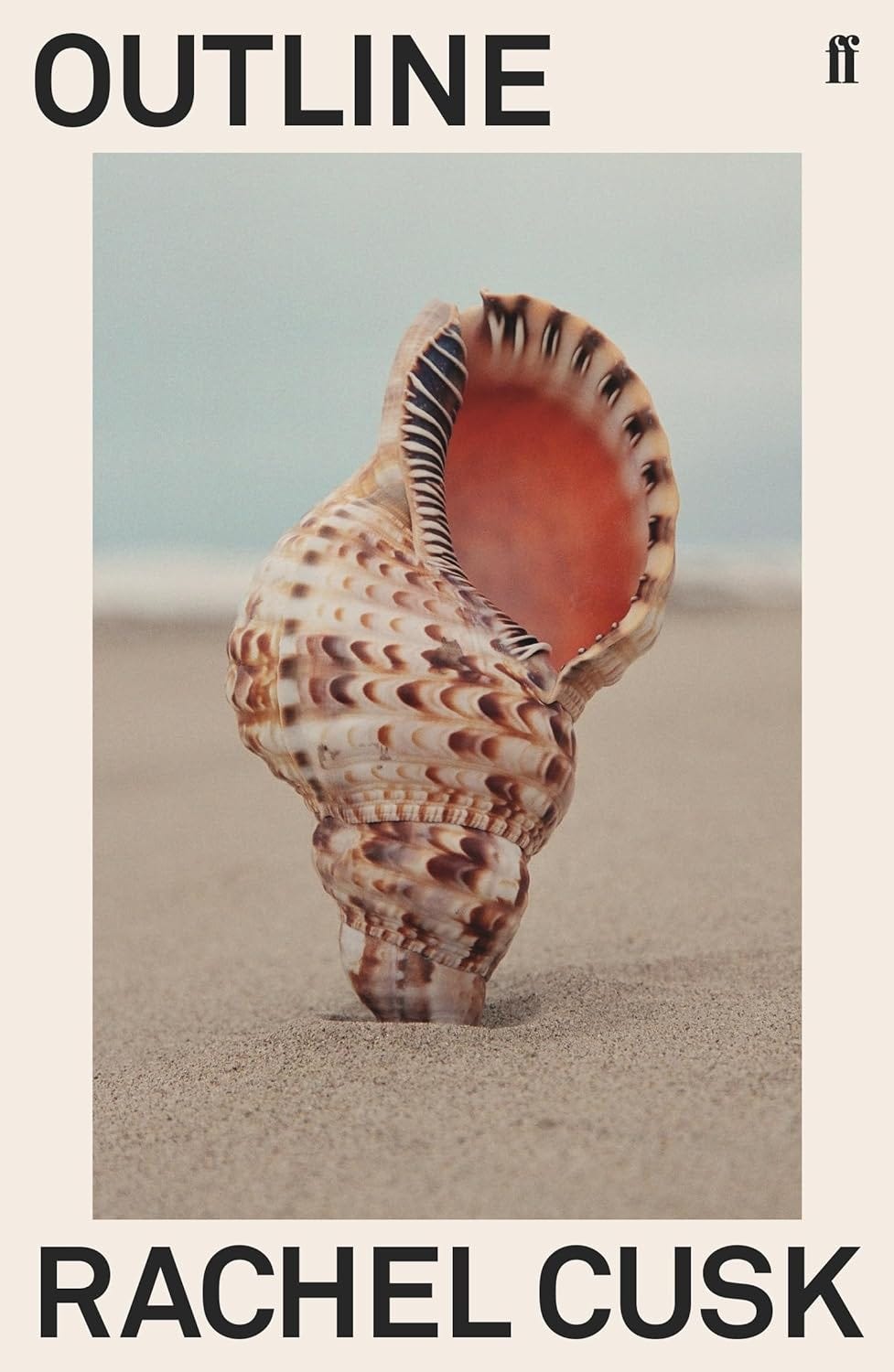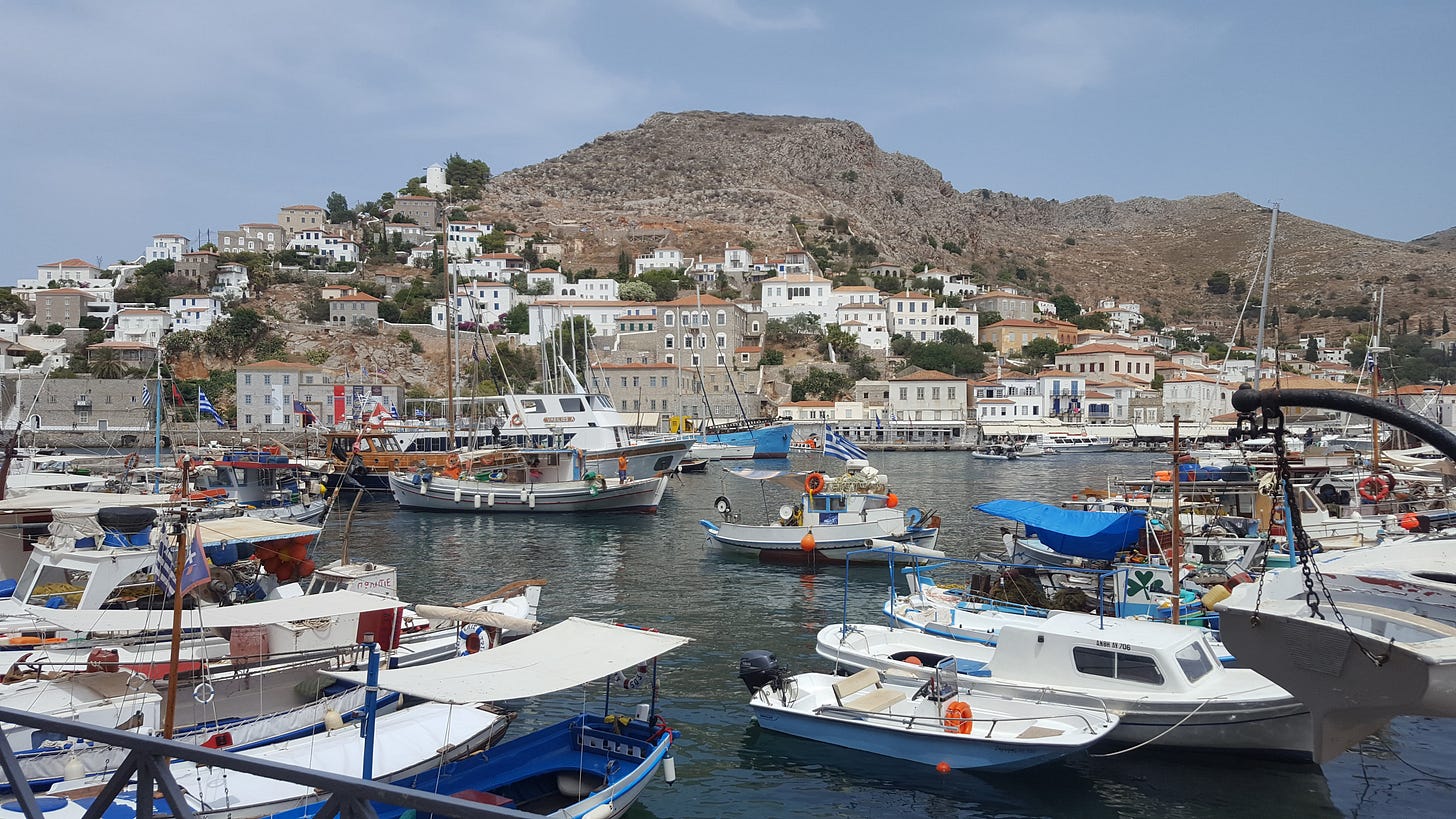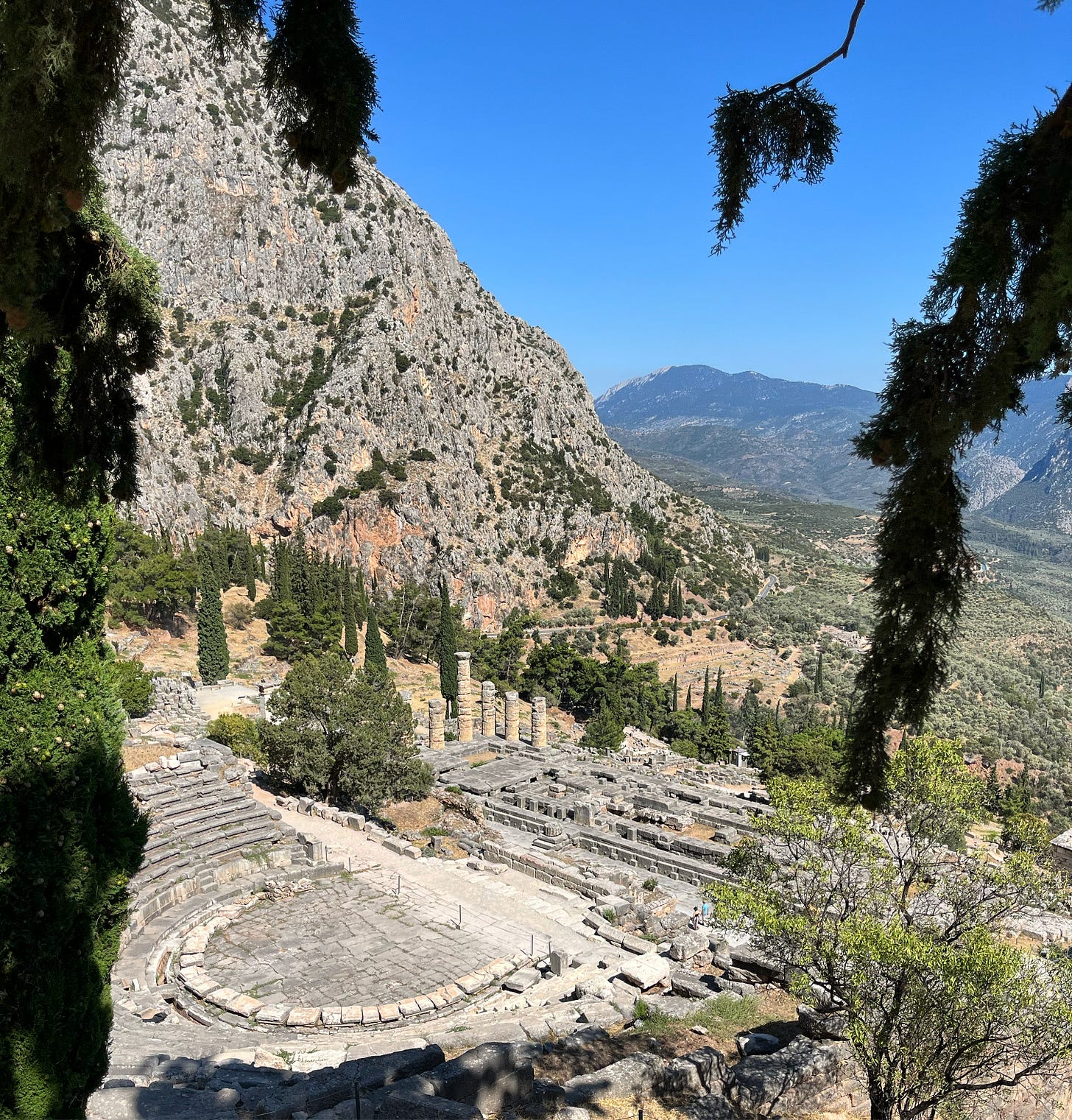This is the first chapter in a long-simmering miniseries called “Narrative Architecture” about storytelling choices in fiction. There are many ways to tell a story, and in this series, I’ll examine the literary choices a particular author made and their impact on the story at hand. This week, I’ll engage with a novel about storytelling itself—Rachel Cusk’s Outline (Picador, 2016) is about an English author visiting Greece, told almost entirely through conversations about the lives of the people she meets.
This post is a revised version of an essay I composed as part of my MFA program at UNR.
The first chapter of Rachel Cusk’s novel Outline opens with the framing device of an international flight. The flight attendants make their rounds, the seatbelt signs turn on and off, and the plane slowly makes its descent. It’s all terribly familiar. In our own experience, we might trade a few commiserating words with our companions seated uncomfortably close to us, and then withdraw into a mediocre inflight film or book.
But the unnamed narrator of Outline, a female writer headed to Athens, Greece to teach a writing course—my dream job, obviously—instead gets into a very intense conversation with her neighbor, an older Greek who resides in England. This man, who is only ever referred to as the narrator’s ‘neighbor,’ proceeds to tell the narrator his entire family history, the contours of his life and motivations mapped onto the choreography of a plane in slow descent. But by the end of this chapter our narrator, practiced in the art of storytelling, quickly discerns the deliberate omissions in her neighbor’s tale:
I remained dissatisfied by the story of his second marriage. It had lacked objectivity… the narrative invariably showed certain people—the narrator and his children—in a good light, while the wife was brought in only when it was required of her to damn herself further. The narrator’s treacherous attempts to contact his first wife, for instance, were given a positive, empathetic status, while his second wife’s insecurity—well founded, as we now knew—was treated as an incomprehensible crime… this was a story in which I sensed the truth was being sacrificed to the narrator’s desire to win. (30)
In this moment, the narrator reveals her exacting gaze on her interlocutor and her condemnation of his self-serving story which paints himself as the hero and everyone else as antagonists.
Though this episode might initially appear an overture before a story involving the narrator serving as an active protagonist in her own story, we quickly learn this isn’t the case. In fact, each of Outline’s ten chapters involve the narrator in conversation with a different acquaintance, and over lush Attic scenes, each acquaintance declares his or her life story, and how they make sense of their story and the relationships that have defined them. Each time, the narrator parses these stories and hones in on their flaws and the hubris of the storytellers, while hardly acknowledging her own problems, which gradually surface to the point that we understand these suppressed problems are quite serious indeed.
The central thesis of Outline seems to be that people—especially storytellers—use storytelling to make sense of their lives and to market their lives to others. Every character the narrator meets hardly hesitates before telling her everything about their lives, at least, the way they see it. This frame, in other writerly hands, could become tedious. But it’s the narrator’s incisive wit and keen observation that makes these conversations fascinating explorations of storytellers desperate to live up to, or outside of, the outlines they have drawn of their lives. Outline answers some structural questions about juxtaposing such a setting with cagey narrators and developing revealing conversations among interview subjects, a process that, by lockstep, complicates and questions both the stories told by the peripheral characters, and simultaneously revealing the stories the narrator is desperate to believe herself.
Throughout Outline, we survey a panoply of Athenian cultured life. Upon the request of the narrator’s friend Paniotis, the narrator and Paniotis meet Angeliki, a feminist writer of great renown. Predictably, Angeliki dominates this conversation by speaking quite pretentiously about her life and aspirations. When Paniotis and the narrator part ways with Angeliki, Paniotis declares “Vanity… is the curse of our culture; or perhaps it is simply my own persistent refusal… to believe that artists are also human beings” (130). Through Paniotis, Cusk makes a cynical observation regarding human egotism. The narrator, however, responds:
I said that in fact I had liked Angeliki, though she appeared to have forgotten that we had met before, at a reading I gave several years ago in Athens…. Paniotis laughed. ¶“That was another Angeliki,” he said, “an Angeliki who no longer exists and has been written out of the history books. Angeliki the famous writer, the feminist of international renown, has never met you before in her life.” (130)
By saving this revelation for the closing pages of the chapter, we learn to the extent that Angeliki’s new narrative has redefined her. She has become so attached to her persona as a major feminist critic she cannot recall a time before that point. And by giving this observation to Paniotis, Cusk makes sure her narrator is not so all-knowing as to cast her judgment on everyone. Rather, she has room to grow and learn from these encounters as well.
Such a framework of confidence and subsequent undercutting leading to growth composes the back-to-back scenes where the narrator travels with her airplane ‘neighbor’ on his boat on the Aegean, and in a rather catastrophic moment of misunderstanding, the older gentleman makes an unwelcome pass at her. Afterwards, the narrator engages with a friend about how she might have been able to avoid such a situation. But first, the unwelcome moment:
There was a certain stiffness in his manner, a self-consciousness, like that of an actor about to deliver a too-famous line. ¶ “I have been asking myself,” he said, “why it is that I find myself so attracted to you.” ¶ He spoke so momentously that I couldn’t help laughing out loud. He looked surprised and somewhat confused by this, but all the same he came towards me, out of the shade and into the sun, heavily yet inexorably, like a prehistoric creature issuing from its cave. (176)
This scene is played in an interesting way—first, the narrator senses the neighbor’s ridiculous placement of himself in alignment with a movie star, of living in the same story as that of a romantic film. Then, instead of playing the scene as something to be feared, or at least reviled, the neighbor, in the narrator’s eyes, is pathetic. Like the misogynistic Greek attitudes which Cusk critiques here, the old Greek is quite literally a dinosaur, albeit stated in at least more evocative language than saying so directly. And yet, while the narrator manages to extricate herself from the neighbor, forcing him to take her back to shore, in the very next chapter we learn that in fact, she has, at least in the judgment of others, been ridiculous herself.
That’s certainly the case when the narrator meets her friend Elena, a woman who declares, in response to learning these events, that:
“If… you had told them the truth, if you had said to him, look, you are old and short and fat, and though I like you the only reason I am really here is to get a ride on the boat—” she began to laugh, fanning her face with the menu “—if you had said those things to him, you understand, you would have heard some truths in return. If you had been frank you would have elicited frankness.” (185)
In this exchange, Elena’s problematic assertion that the narrator had been “asking for it” or “should have known better” is complicated by her suggestion that if the narrator were truthful to her neighbor, she would have received truths in return, and that these truths would sting. This dialogue thus does double-duty in pointing out a likely critique a theoretical reader might have of the narrator’s conduct with the neighbor, and also striking at the heart of the narrator’s problem—her refusal to own up to her own life’s precariousness. As we learn elsewhere in the novel, the narrator is losing her London apartment, and she’s losing track of her son. In effect, her life is falling apart while she continues to circulate through Athens.
In a novel composed predominantly of conversations, dialogue must serve multiple aspects simultaneously to keep readers engaged. But even such moments of dialogue need to move the story forward and point even deeper at the flaws of the protagonist, as Outline does when we learn that Elena, in fact, is a fatalist and thus has no more of a claim to knowing the right way to interpret events than anyone else in the novel. As Elena states her relationship philosophy in the following soliloquy:
“If the relationship is going to end, in other words, I want to know it and confront it as soon as possible. Sometimes… this process is so quick that the relationship is over almost as soon as it has begun. Very often I have felt that my relationships have had no story, and the reason is because I have jumped ahead of myself, the way I used to turn the pages of a book to find out what happens in the final chapter. I want to know everything straight away. I want to know the content without living through the time span.” (191)
Such monologues would feel out of place in novels driven by action, but this is a story about stories defining lives, and Elena’s commentary on her need to avoid story and seek outcomes has defined her life by foreshortening all her romantic relationships. Meanwhile, the narrator’s drive throughout the novel is to dismiss the stories she hears from others, while hardly acknowledging any of her own faults; if the narrator had actually engaged with others, such an interplay could be mutually beneficial to both parties and help build true relationships. Instead, we are left with the narrator’s outline—an outline of relationships she might have lived, had she deigned to entertain the possibility of sharing faults and coming to mutually honest assessments with others. To borrow the narrator’s language, the dialogues complicate and help us understand the protagonist “winning” and “losing” and finding her own ways to “win” despite losing, until such a process is no longer possible—in the end, she returns to London to face what she has tried to avoid entirely.
On one very cynical level, the novel critiques the egomania of writers and those who aspire to the profession, but also the egomania of literally everyone implicated in the twenty-first century social-media landscape. Constantly, we are bombarded with Facebook, Twitter, and Instagram glamor posts, individualistic declarations of superiority and triumph; as a result, it does not seem surprising that Western society (Cusk is a Canadian resident of the UK), have so often elected men embodying megalomania to the highest offices. Meanwhile, most equipped with Internet-mediated voices use their megaphones to criticize others while quite deliberately avoiding self-reflection, for fear of admitting a fault which could also be broadcasted and grounds for one’s own character assassination by fellow masses of aspiring individualists.
Outline is the first book in a trilogy I have not finished; the next two books involve the narrator confronting the situation she had previously abandoned in London. While the narrator’s story is incomplete, Outline does not feel that way. This is the paradigm of a novel’s structure matching its thematic ambition. While we receive many sketches of characters the narrator meets, we never learn more than the bare bones of the outline of the narrator’s life. At the same time, Outline accomplishes much by saying a lot, which, in the end, means little. In doing so, it makes a damning point.
References
Cusk, Rachel. Outline. Farrar, Straus & Giroux: NY, 2014.





